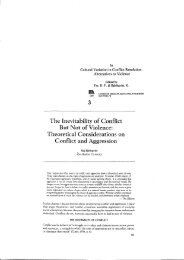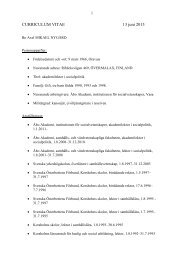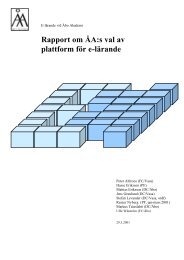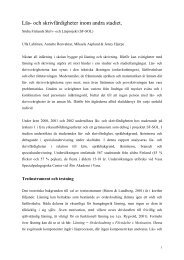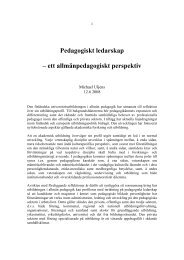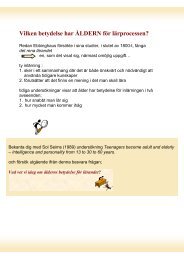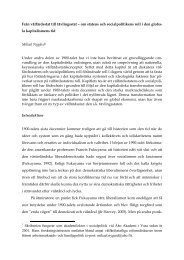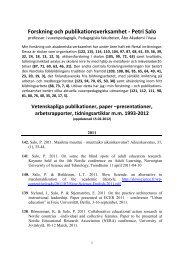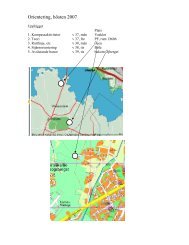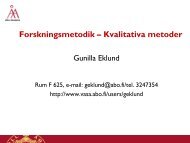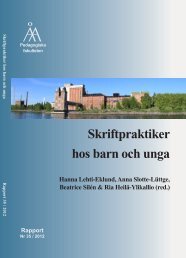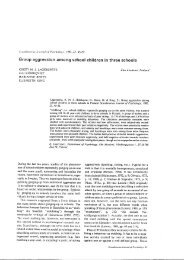Parties, Candidates and Citizens On-Line - Åbo Akademi
Parties, Candidates and Citizens On-Line - Åbo Akademi
Parties, Candidates and Citizens On-Line - Åbo Akademi
Create successful ePaper yourself
Turn your PDF publications into a flip-book with our unique Google optimized e-Paper software.
economic patterns usually associated with off-line political activity were also by-<strong>and</strong>-large<br />
replicated regarding the use <strong>and</strong> emphasis placed in on-line sources for election<br />
information. There were, nevertheless, some indications which provide prospective<br />
support for the mobilization theory. The insignificance of both class <strong>and</strong> income in<br />
predicting citizens’ visits to political websites, <strong>and</strong> the interest <strong>and</strong> emphasis in on-line<br />
political information showed by the younger generations of Finnish voters merit<br />
attention. These findings give reason for some optimism regarding the future of the<br />
medium, especially as the young are “currently least engaged in the political process <strong>and</strong><br />
least attentive to conventional news media” (Norris 1999, 85).<br />
2.2.2 <strong>On</strong>-line political discussions – activity <strong>and</strong> impact<br />
An analysis of citizens’ discussions on the internet prior to, during, <strong>and</strong> after the 2003<br />
parliamentary election was conducted in the thesis’ fifth article (Str<strong>and</strong>berg 2005). The<br />
activity on four discussion boards provided by the Finnish parties <strong>and</strong> one discussion<br />
board provided by a Finnish web portal were examined. As such, this article provides<br />
indications of the general level of interest in participating in on-line political discussion.<br />
The article also sheds light on what impact, in terms of politically engaging <strong>and</strong> making<br />
the citizens more articulate in expressing political views, this activity has on citizens. It<br />
should, however, be noted that the article has not thoroughly examined individual-level<br />
changes in political preferences, interest <strong>and</strong> motivation. The findings of the article should<br />
therefore be considered more as aggregate-level indications of the plausibility, or lack<br />
thereof, of the mobilization <strong>and</strong> reinforcement theories.<br />
The findings of the article provide several interesting findings concerning the<br />
theories. The study showed that only one discussion board – hosted by the National<br />
Coalition Party – had a significant amount of activity in terms of discussion threads. None<br />
of the discussion boards activated large numbers of citizens. In fact, in roughly 90 per<br />
cent of the debates, only a maximum of eight citizens participated. Similarly, when<br />
compared to a non-political forum, a political forum on an independent web portal<br />
attracted a lower number of debaters. These findings give very little reason for optimism<br />
regarding citizens’ use of the opportunities for political activity on the web. These<br />
findings strongly support the reinforcement theory. The analysis of the quality of the<br />
citizens’ discussions similarly revealed an utterly off-putting picture. The discussions<br />
generally lacked both liveliness <strong>and</strong> intensity. The Finnish citizens did not engage in long,<br />
continuous debates over public matters (cf. Barber 1984, 178). In fact, on average, the<br />
citizens who participated in the discussions only posted a maximum of roughly 1.5<br />
messages to the discussion threads. The impact of on-line political discussions on citizens<br />
appears to be quite limited. In other words, with reference to the mobilization theory,<br />
178



